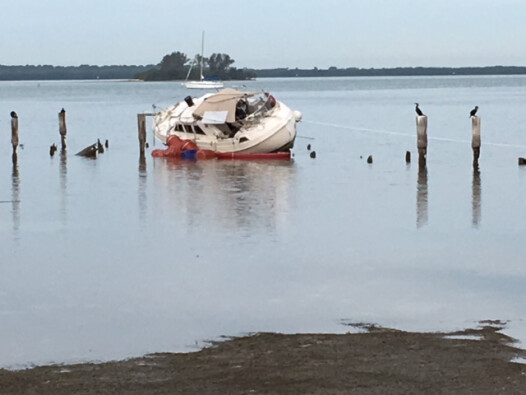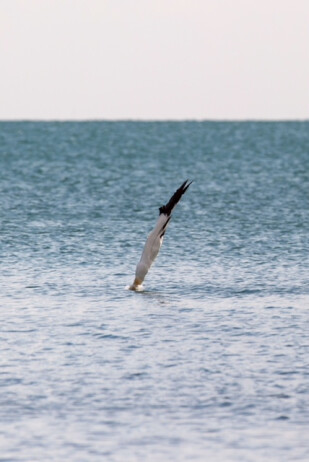An osprey or a stranded sailboat: which are you?

When I was in my early 20s, I almost moved to Florida. At the last minute, I changed my mind, repelled by an abundance of older residents whose lives did not show any evidence of transformation or improvement. Despite their maturity, so many seemed short on character and wisdom.
It was the dawn of my realization that age and experience would not naturally make me better. If I wanted to be a person of substance, I would have to try.
In my early 50s, Florida acquired new appeal. Weary of Indiana’s bitter winters and blessed by a job that allows me to work from home, I began to plan a seasonal escape. I’ve spent the past five Januarys living and working in the Tampa Bay area. What has changed since my first visit over 30 years ago? More development, more people, but otherwise—not much.
People still come to refresh themselves, to rebuild their lives or to escape the worst of winter. I still study them, hoping to uncover the secrets of a productive life after a certain age. With more age and experience of my own, I observe with far more compassion than I could muster as a twenty-something, knowing how hard one must work to avoid being beaten down by life.
At any age, you can live like a dilapidated sailboat, abandoned in Florida’s intercoastal waterways, or like the birds that hover over the water in search of food. Consider the difference.
The stranded sailboat is a regular at Florida’s ubiquitous Happy Hours. They arrive at a waterside bar at 5 p.m. under the pretense of appreciating a gorgeous sunset. At 6:30 p.m., they leave neither happy nor sober.
After a couple of double Manhattans made with a carefully-selected bourbon that shows their good taste, the lucky ones stagger away, guided by a sober spouse or significant other. They search for a place to have coffee, hoping to avoid the spectacle and danger of a fall on the walk home.
Sailboats are marooned for two reasons: a) we’ve lost our map and sails, and b) we are anchored in a shallow harbor by anxiety, boredom, frustration, addiction
Does a dilapidated sailboat find rest, renewal or inspiration in its new locale? Oh, no, no, no. It cannot ask, “What do I want? What should I do? Where should I go? How can I serve?”
Dull and weather-beaten, we repeat the same question: “Is this all there is?” Life is a constant disappointment. A brilliant sunset and watercolor sky fail to impress. Even the prospect of a rising tide or an all-new sail does not offer hope. The sailboat wonders if he will ever be seaworthy again.
He complains about his broken parts.
“Oh, my back.”
“Oh, my knee.”
“I’ll never get over losing my (fill in the blank: son/daughter/boyfriend/husband).”
He relives the painful/familiar past over and over again, hoping for a different result. He finds new friends and mates just like the troubled people who’ve hurt him before. Different harbor, same scene.
Of course, no one intends to live like a dilapidated sailboat. It’s a gradual, unconscious slide—a mid-life or post-crisis stall. Most everyone would rather be more like an osprey or a cape garret.

These magnificent birds never go hungry because they know where to find nourishment. They search for waters teeming with food. When a cape garret finds what it wants, it goes after its target with everything it has, plunge-diving into the water like an aerodynamic missile at speeds of up to 60 miles per hour.
The osprey is someone who finds something valuable to do. This species never plays the age card. In her 60s, she may move to Florida from Michigan and start a restaurant and catering business. Her creed: Let me die
An osprey perseveres through physical illnesses and loss. On the other side of a struggle, he writes about his interaction with God, draws art with original sayings and sells his handmade work to tourists. He builds his first website or publishes his first blog or book. He reads books to children at the library.
Without burning any bridges, an osprey draws boundaries for the naysayers, co-dependents
An osprey carefully selects unfamiliar waters to challenge his skills, rather than fishing where he has come up
If a bald eagle tries to steal lunch from an osprey’s talons, the two birds play chase in the air. In the end, the osprey simply drops his prey and goes fishing again. The drama is over.
In advanced age or poor health, the osprey works with what he has. He devours the books he has never had time to read. He perfects his golf game. He stands with strangers in mutual awe of God’s creation. He learns to paint or draw or quilt. When he can no longer cut the lawn or clean the house for an ailing neighbor, he writes encouraging notes instead. He sets a beautiful table, plants a garden, savors a bite.
As human beings, we’re all at risk of stalling out at some point. In God’s word, we can always find a map and sail. We can act upon our God-given creative instincts and seek redemption. The choice is ever before us, isn’t it? Whether to live anew, or remain trapped in the habit of sin, freeloading on God’s grace.
